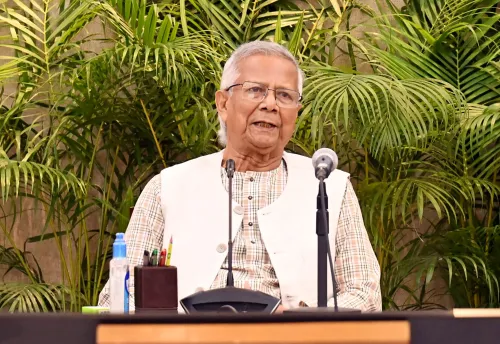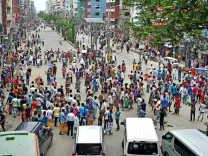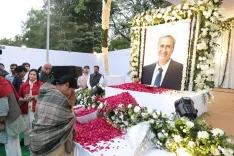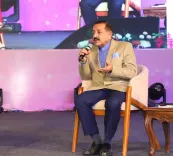How Did Ukraine Execute Operation Spider Web Against Russia?
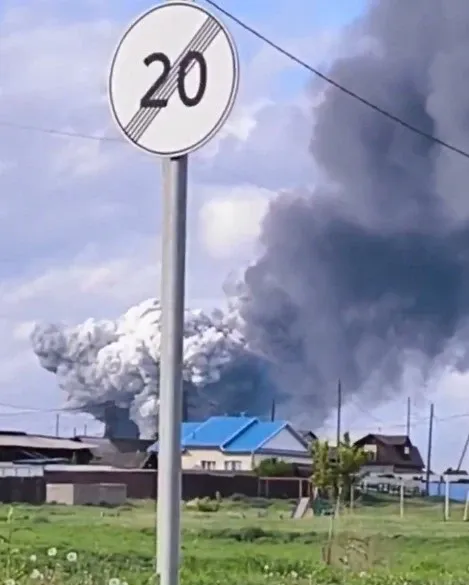
Synopsis
Key Takeaways
- Operation Spider Web involved extensive drone strikes on Russian airfields.
- Ukraine's SBU claimed damage to at least 41 aircraft.
- The estimated cost of the destroyed aircraft is around $7 billion.
- Drones were covertly transported into Russia for the operation.
- The operation was meticulously planned over a year and a half.
Kyiv, June 2 (NationPress) Ukraine initiated Operation Spider Web against Russia, executing extensive drone strikes aimed at multiple airfields situated deep within Russian territory.
This military endeavor unfolded amid planned peace negotiations between Russia and Ukraine in Istanbul.
Reports indicate that Ukraine's Security Service (SBU) successfully targeted at least 41 aircraft that were allegedly employed to bombard Ukrainian cities. This included Tu-22 and Tu-95 strategic bombers, along with the A-50 radar detection and command aircraft.
Ukraine claimed to have inflicted damage on Russian military aircraft valued at $7 billion during the drone strikes.
"$7 billion: This is the estimated value of the enemy's strategic aviation impacted today as a result of the SBU's special operation," the agency shared on social media.
Russia confirmed the events, stating that the attacks were thwarted in the regions of Ivanovo, Ryazan, and Amur.
"No casualties were reported among servicemen or civilians. Several individuals involved in the terrorist attacks were apprehended," the Russian defense ministry stated on Sunday.
It further noted that drones launched from nearby regions resulted in several aircraft catching fire in the Murmansk and Irkutsk areas, with no injuries reported among military personnel or civilian staff.
"Today, a remarkable operation was executed -- on enemy soil, targeting solely military installations, specifically the equipment utilized to strike Ukraine. Russia sustained significant losses -- entirely justified and deserved. The preparation spanned over a year and a half. Every detail was meticulously executed. It can confidently be said that this was an absolutely unparalleled operation," remarked Ukrainian President Volodymyr Zelensky in a post on X.
He mentioned that the operation utilized a total of 117 drones, with an equivalent number of drone operators involved. Furthermore, 34 percent of the strategic cruise missile carriers stationed at air bases were impacted.
"Our forces operated across multiple Russian regions -- in three distinct time zones. It brings immense satisfaction when an initiative I authorized a year and a half ago comes to fruition and deprives Russians of over forty units of strategic aviation. We will continue this mission," he added.
The operation required particularly intricate logistics. Drones were covertly transported into Russia in advance, concealed under the roofs of wooden cabins mounted on trucks, as per media reports.
When the time for the assault arrived, the roofs of these structures were remotely opened, allowing the drones to proceed towards their short-range targets, the reports suggest.
Russia admitted that several of its aircraft "caught fire" during the attacks.
"Due to the launch of FPV drones from areas near military airfields in the Murmansk and Irkutsk regions, several aircraft were set ablaze. The fires were extinguished," stated the Russian defense ministry.
Meanwhile, on Monday, Russia and Ukraine are set to conduct the second round of direct negotiations in Istanbul.
The new meeting was announced on May 28 by Russian Foreign Minister Sergei Lavrov.
Russian Foreign Ministry Ambassador at Large on Kyiv's War Crimes, Rodion Miroshnik, criticized Ukraine, claiming that Kyiv is "destabilizing the situation" ahead of talks in Istanbul, which is unacceptable.
Earlier on Sunday, Russian Foreign Minister Sergei Lavrov and US Secretary of State Marco Rubio discussed the circumstances surrounding the Ukrainian crisis in a phone call, according to the Russian foreign ministry.
"Sergei Lavrov and Marco Rubio exchanged perspectives on various initiatives for a political resolution of the Ukrainian crisis, including plans for the resumption of direct Russian-Ukrainian discussions in Istanbul on June 2," it stated.





